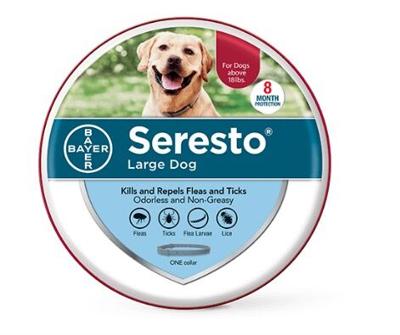Three veterinary experts in the Valley questioned claims in an investigative report linking the popular Seresto pet collars for flea and tick treatment with illness in dogs, cats and humans.
Dr. Beth Crombie, a co-owner of Lewisburg Veterinary Hospital in Lewisburg, Dr. Tristan Wilhelm, a co-owner of Susquehanna Trail Animal Hospital in Watsontown, and Dr. Jayne Kubat, a veterinarian and an adjunct assistant professor of biology at Bucknell University, all said they believe the product to be safe for consumers and their pets.
“I bet you I’ve sold 10,000 of the things. The only reactions I’ve ever seen is occasionally a localized skin reaction where the collar was placed,” Crombie said.
The Midwest Center for Investigative Reporting co-published a report Tuesday with USA Today alleging Seresto collars are linked to at least 1,698 pet deaths since 2012 and, through June 2020, 75,000 incident reports of pet illness and more than 900 reports of human harm.
The report cites incident data self-reported by consumers to the U.S. Environmental Protection Agency. It knocks the agency for failing to warn the public of potential hazards.
Each of the experts wondered whether the thousands of self-reports made by consumers to the EPA might largely be the result of having unknowingly used counterfeit products purchased through Amazon or other non-pet specialty retailers. Either way, they noted the reports hadn’t been confirmed through formal investigation.
“I’m frustrated about it. I do believe it’s misinformation and it’s not fair to the public. I think they’re false claims and I don’t think they’ll go anywhere other than scaring a bunch of people,” Wilhelm said. “As a whole, they’re pretty safe. I’m not pulling them off the shelves.”
Seresto, developed by Bayer, was approved for use in 2012. The product was sold off to Elanco in 2019. It uses two active insecticides to repel fleas and ticks — imidacloprid and flumethrin. The chemicals are slowly released from the collars over the course of the recommended 8 months of usage. They retail for about $60.
Elanco released a statement in response to the investigative report, saying 25 million Seresto collars have been sold since 2012. It said the reporting rate for all adverse events related to the collars is 0.3%, largely with reports of reddening of the skin or hair loss below the collar.
“It is critically important to understand that a report is not an indication of cause,” Elanco’s statement reads, adding that the product undergoes continued regulatory scrutiny. “There is no established link between death and exposure to the active ingredients contained in Seresto.”
Kubat isn’t currently practicing veterinary medicine in the area, however, she said she does continue to work exclusively for emergencies in Pennsylvania and Texas. She once volunteered at the White Mountain Indian reservation in Arizona where a grant was received to use Seresto on dogs to stop the spread of Rocky Mountain Spotted Fever, a potentially fatal disease, among the people who lived there. It worked, Kubat said, adding there were no adverse reactions to the animals or humans.
An EPA report from 2016 on the project confirmed her assessment. It states that the use of the collars was safe for humans, noting some skin irritation. Same for the dogs. The report did acknowledge claims made to EPA of adverse impacts on domestic dogs, not specific to the reservation, that were being investigated.
Kubat also cited a 2012 study published by the National Institutes of Health where more than 700 cats and dogs were involved in a study of Seresto collars. The study concluded it was safe and effective.
“I have personally recommended Seresto for hundreds of dogs and treated thousands of dogs and cats who used the product. I’ve used this for my own pets and will continue to use it on the indoor/outdoor cats we have. This information is not new and they haven’t been investigated,” Kubat said.
When raising the potential of counterfeit Seresto collars, Crombie said she’s seen fakes firsthand. The tin packaging looks strikingly similar to the valid product. The shrink wrapping on the collar is similar, too, but not exact. She added they often lack reflective materials placed on the real collars.
“This year alone we’ve probably caught at least 30 counterfeits,” Crombie said, advising consumers to purchase the collars through pet-specific retailers like Chewy or PetMeds.
Kubat, too, said she’s had many clients over the 9 years she practiced full-time purchase counterfeit collars. Like Crombie, she said many were purchased through Amazon.
“If you’re ever in doubt, always ask your vet and we can help you figure out if it’s counterfeit or not,” Kubat said.

